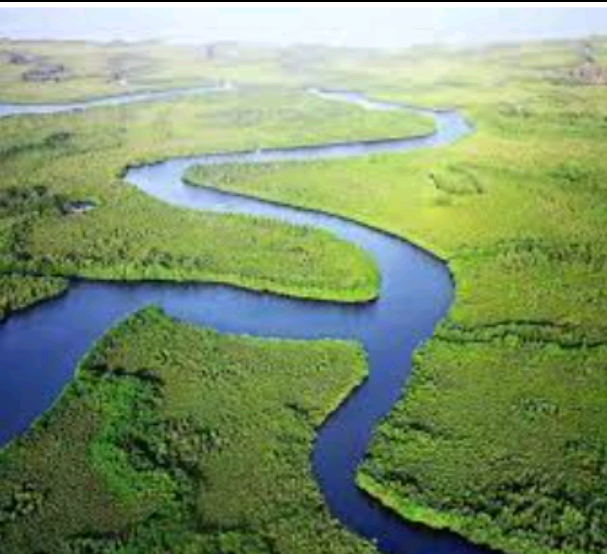The Niger river is the major waterway and source of water in West Africa. The historical significance of the Niger River is huge, considering how it has contributed to the development of West African nations for centuries. This 4200 kilometer-long waterway or (2,585 miles) is the third longest river in Africa, and one of the 15 longest rivers across the world. Taking its origin in the Fouta Djalon mountains of Guinea, it arches upwards through Mali, then through the Sahara desert. It finally turns southwards, merging with tributaries along the way until it fans out into a vast delta (the Niger Delta). The many rivers and inland waterways of the Niger Delta ultimately empty themselves into the Atlantic Ocean.
The Niger River has for long, been an important aspect of the culture and commercial life across West Africa. We will briefly examine how the Niger River has influenced the unique history and livelihood of inhabitants of the West African region over the ages.
Facts and Figures About the Niger River
The great arc and waterway known as the Niger River, is the major river in West Africa. It is only smaller in length to River Nile and River Congo (first and second longest in Africa respectively). It meanders through four countries namely Guinea, Mali, Niger, and Nigeria; and flows along the northern boundary of Benin republic. It meets its main tributary, the Benue River, at the confluence town of Lokoja (in Nigeria) before fanning out into the Niger Delta. In total, the Niger River has 59 tributaries flowing into it.
The waters of the Niger river are relatively clear, and do not carry as much silt as the River Nile. The river also regularly overflows each year between September and May into its surrounding flatlands, known as the Niger River Basin. The Niger River Basin spreads across ten countries of West Africa, that are directly or indirectly nourished by the river. They include Algeria, Chad, Benin, Burkina Faso, Cameroun, Mali, Guinea, Cote d’Ivoire, Niger, and Nigeria.
Yet again, the Niger River has been called various names by the nearby tribes. They include:
- Maayo or Jaaliba (Fula)
- Jeliba or Joliba (Manding)
- Egerew n-Igerewen (Tuareg)
- Isa (Songhai)
- Isa Beeri (Zarma)
- Èdù (Nupe)
- Ọya (Yoruba: named after the Yoruba goddess, Oya)
- Orimiri or Orimili (Igbo)
- Toru Beni (Ijaw)
- Kwara (Hausa)
How the Niger River has Shaped the History of West Africa
The Niger River, being a major travel route across West Africa, has contributed to the emergence of big Sudanese empires. They include the Songhai, Mali, Ghana empires; as well as Ijo city-states. Several ethnic groups also established themselves along the course of the Niger River and the Niger Delta. They include the Bambara and Songhai (Mali); the Jerma (Niger); the Nupe (central Nigeria); the Igbo (southeast Nigeria); the Ijaw, Urhobo, Itsekiri, Ibibio, Efik, and several other tribes (Niger Delta in Nigeria).
In fact, the earliest European explorers, merchants, and missionaries, were able to access the interiors of West Africa through the Niger Delta end. It eventually gave access to the entry of the Royal Niger Company of Great Britain (founded in 1886). It paved the way for the British government to take control of the Niger Delta region, and eventually Nigeria. On the other hand, the government of France also gained access into West Africa through the Niger River. Upon entry, they established the French colonies of Mali, Niger, Senegal, and Guinea.
Contributions of the Niger River to West Africa’s Economy
For centuries, the Niger river has served as a major travel route for traders, travelers, and explorers. A good number of trading ports were established along its route, including Timbuktu (at the northwest end). The southern end where it forms the Niger Delta has been an important trading region and seaport for a long time. It started right from the first visit of European explorers sometime between the 16th and 18th Centuries.
The Niger River is also an important source of water for domestic uses, irrigation on farmlands, and the production of hydroelectric power in modern times. For instance, the Kainji dam in Nigeria is a major hydroelectric dam positioned along the Niger River to generate electricity. It supplies electricity to the countries of Benin and Nigeria. At present, the Niger River has 21 hydroelectric power stations positioned along its course. Some of the other notable dams along its course include Sotuba and Markala (used for irrigation projects); Shiroro, Zungeru, and Jebba Dams.
Yet again, the river nourishes the Niger Delta region. This important section of the Niger River Basin is a very fertile fishing, farming, and commercial port zone. Additionally, It has huge reserves of crude oil. As such, the Niger Delta is an important region for petroleum and natural gas production (in Nigeria).
Right from the 1930s, the French colonial government had dug out irrigation channels in Mali to channel the river’s water into farms. Such farms were used for the cultivation of sugarcane, rice, and cotton.








